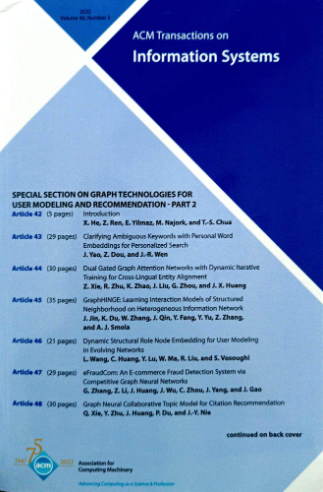更好地理解程序性搜索任务:感知、行为和挑战
IF 9.1
2区 计算机科学
Q1 COMPUTER SCIENCE, INFORMATION SYSTEMS
引用次数: 0
摘要
人们经常通过搜索信息来获取程序性知识——关于一步一步的程序、方法、算法、技术、启发式和技能的“如何”知识。程序搜索任务可能涉及实现问题的解决方案,评估解决问题的不同方法,以及对可以使用特定资源解决的问题类型进行头脑风暴。我们报告了一项研究(N = 36),旨在更好地了解人们如何搜索程序性知识。许多研究调查了搜索任务特征是如何影响人们的感知和行为的。沿着这些思路,我们沿着两个正交的维度操作程序搜索任务:产品和目标。产品维度与任务的主要结果有关,目标维度与任务的成功标准有关。我们在三个产品类别和两个目标类别中操作任务。该研究调查了四个研究问题。首先,我们研究了产品和目标对参与者(RQ1)任务前感知、(RQ2)任务后感知和(RQ3)搜索行为的影响。其次,无论任务产品和目标如何,通过分析参与者的有声思考评论和筛选活动,我们仔细研究了人们如何搜索程序性知识。具体来说,我们报告了(RQ4)重要的相关标准、所寻求的信息类型和挑战。本文章由计算机程序翻译,如有差异,请以英文原文为准。
Better Understanding Procedural Search Tasks: Perceptions, Behaviors, and Challenges
People often search for information to acquire procedural knowledge–“how to” knowledge about step-by-step procedures, methods, algorithms, techniques, heuristics, and skills. A procedural search task might involve implementing a solution to a problem, evaluating different approaches to a problem, and brainstorming on the types of problems that can be solved with a specific resource. We report on a study ( N = 36) that aimed to better understand how people search for procedural knowledge. Much research has investigated how search task characteristics impact people’s perceptions and behaviors. Along these lines, we manipulated procedural search tasks along two orthogonal dimensions: product and goal. The product dimension relates to the main outcome of the task and the goal dimension relates to task’s success criteria. We manipulated tasks across three product categories and two goal categories. The study investigated four research questions. First, we examined the effects of the product and goal on participants (RQ1) pre-task perceptions, (RQ2) post-task perceptions, and (RQ3) search behaviors. Second, regardless of the task product and goal, by analyzing participants’ think-aloud comments and screen activities we closely examined how people search for procedural knowledge. Specifically, we report on (RQ4) important relevance criteria, types of information sought, and challenges.
求助全文
通过发布文献求助,成功后即可免费获取论文全文。
去求助
来源期刊

ACM Transactions on Information Systems
工程技术-计算机:信息系统
CiteScore
9.40
自引率
14.30%
发文量
165
审稿时长
>12 weeks
期刊介绍:
The ACM Transactions on Information Systems (TOIS) publishes papers on information retrieval (such as search engines, recommender systems) that contain:
new principled information retrieval models or algorithms with sound empirical validation;
observational, experimental and/or theoretical studies yielding new insights into information retrieval or information seeking;
accounts of applications of existing information retrieval techniques that shed light on the strengths and weaknesses of the techniques;
formalization of new information retrieval or information seeking tasks and of methods for evaluating the performance on those tasks;
development of content (text, image, speech, video, etc) analysis methods to support information retrieval and information seeking;
development of computational models of user information preferences and interaction behaviors;
creation and analysis of evaluation methodologies for information retrieval and information seeking; or
surveys of existing work that propose a significant synthesis.
The information retrieval scope of ACM Transactions on Information Systems (TOIS) appeals to industry practitioners for its wealth of creative ideas, and to academic researchers for its descriptions of their colleagues'' work.
 求助内容:
求助内容: 应助结果提醒方式:
应助结果提醒方式:


